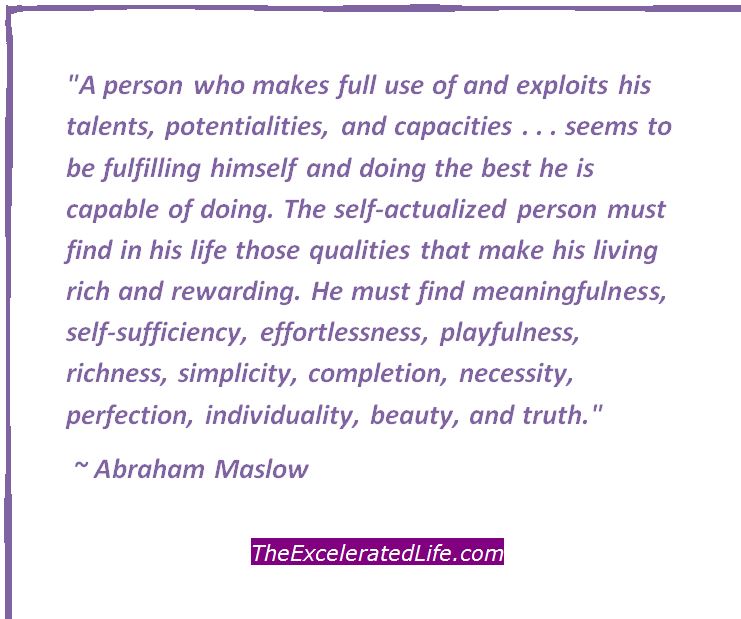“Struggling is an expression of one’s unmet needs.” ~ Thomas Leonard.
What are you struggling with or against? There is a place you need to build a reserve.
Do you have enough?
In the Excelerated Life model, there are 3 principles that may seem to conflict: 1) Excelerated simplicity — freeing yourself from unnecessary complexity; 2) Being clutter-free and well-enough organized — able to find what you need when you need it, and 3) Excelerated reserves — building your reserves in all areas. Excelerated simplicity and being clutter-free go hand in hand, but how do we reconcile these principles with building Excelerated reserves – with accumulating more stuff?
Ranking human needs
Well, let’s begin with Abraham Maslow. In the early 1940’s, Maslow proposed a hierarchy of needs – motivators of human behavior that he saw as falling into a specific rank order. For example, at the lowest level of the hierarchy, Maslow placed physiological needs, such as the need for food, water, air, sex, sleep, excretion (or elimination of wastes), and homeostasis – the need for the body to maintain equilibrium among its systems, for example keeping the body’s temperature at 98.6 degrees (F).
After physiological needs in the hierarchy come, in the order Maslow placed them, Safety, Love & Belonging, Esteem, and at the top of the pyramid . . . Self-actualization.
One reason Maslow ranked the various needs into a hierarchy is this: If you have an unmet need on a lower level, you are not going to work on your needs at a higher level. For example, if you are sitting in a room, and suddenly all the air is removed, you are only concerned with 1 thing . . . being able to breathe again. You aren’t going to be thinking of security or employment or even sex. Your only motive is to get air. If you are starving, your primary need is to find food. If you haven’t had water in a couple of days, your main objective is to get a drink. You get the idea.
The need of Enough
This is where the concept of Excelerated reserves — building your reserves in all areas — comes into play. Having enough resources comes pretty low on the hierarchy. And if you don’t believe you have enough of _____, you name it, you likely are not going to focus on the higher levels. You certainly aren’t ready for self-actualization. But it seems that many of us don’t really pay attention to these unmet needs.
The idea of building Excelerated reserves goes beyond the 1st or 2nd level of Maslow’s hierarchy. In fact, it can apply to the needs on any level. Excelerated reserves are not simply material needs, although they certainly do apply to those, but non-material needs as well, needs such as love, time, space, leisure, respect, etc., etc. You aren’t stockpiling inventory simply for the sake of amassing possessions. But, as Thomas Leonard said, “You just want to be so well supplied that you will be able to lead a terrific life far enough beyond the reach of scarcity.” [Leonard]
When you take steps to get your physical and psychological needs met automatically, you free up time and mental energy to devote to achievement and self-actualization. How do you get your needs met automatically? By building reserves of the things you need. By building and keeping reserves of time, money, supplies, resources, people and love, you are no longer in survival mode. You free up the energy that you spent to survive and use it to grow and thrive.
The psychology of Enough
A reserve is a feeling or a state of mind. A reserve is the sense that you have enough, so that it is no longer something you have to think about. A reserve may be a stockpile of supplies, such as household goods. A reserve may be extra space that results from simplifying your life. A reserve may be free time that comes from rethinking your priorities and commitments.
Creating reserves isn’t about conspicuous consumption or amassing goods for the sake of having more stuff. Having a good reserve in all areas of your life is essential for your personal development. Until you have your physical and psychological needs taken care of, you will not have the energy or the focus to discover and share your unique purpose. Until you get your basic needs met, it is difficult to concentrate on your higher purpose. When taking care of your physical needs consumes most of your time, you can’t think about your higher calling.
Simply Enough
So, you see, the principles of Excelerated reserves, Excelerated simplicity and being clutter-free and well-enough organized are not contradictory. Each has its own important place in the Excelerated Life. Having the necessary reserves can help you simplify by reducing distractions. Eliminating clutter helps you see what you do need and keeps unnecessary items from accumulating.
When is enough Enough? When you say it is — when you have your needs met at the lower levels of Maslow’s hierarchy so that you can focus on the higher levels . . . and on your higher calling. And that is embracing the Excelerated life!
* * * * * * * * * * * * * * * * * * * * * * * * *
Excelerated reserves — building your reserves in all areas — is one step in creating your Excelerated life, a life of well-being, meaning, and purpose.
Leonard, Thomas. The 28 Laws Of Attraction. New York: Scribner, 1998


